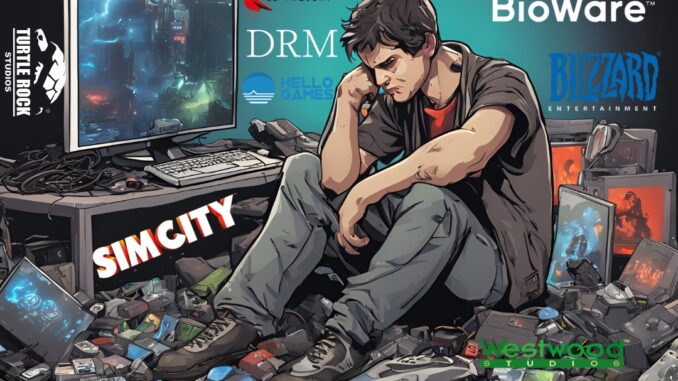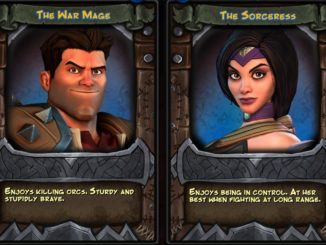
If you play video games long enough, the odds of being let down by your favorite game studio increases dramatically. Most gamers have, or had, that one developer who just kept getting things right. But, eventually, that same favorite developer stumbles and produces a game that makes you scratch your head, smash your keyboard, or let loose a torrent of tears that would rival any amount of water in a video game. A game so bad or off the beaten path that it broke the spell of admiration and trust you once had in that developer.
When it comes to that soul-crushing experience it could be one simple factor or a plethora of issues congealing into a vast cesspool of disappointment. From expectations not being met, to the commercialization of a game, the loss of identity of a franchise, DRM, and technological overreach are factors which can contribute to gamers becoming soured towards a video game studio.
Betrayal of Expectations
For many developers, it takes years, and even decades, to build up a reputation for developing games that resonate with their audience. A trust is developed between the game studio and its audience so that, when a new game is announced, they are the first ones making their pre-orders and generating buzz online. Eventually, expectations are put upon the studio and its continued work. However, sometimes a studio then starts to overhype their work, create expectations, or make promises that they fall short of.
There are a number of examples one can point to of this. The Fable franchise would be one of the more notorious examples given video game designer and programmer Peter Molyneux’s penchant for overselling the game and making promises about features and scopes that always fell short. But then there is BioWare, a developer that has been around for almost 30 years with a substantial collection of phenomenal titles that includes Baldur’s Gate, Star Wars: Knights of the Old Republic, Dragon Age: Origins, and Mass Effect. The Mass Effect franchise built up a major expectation when it came to Mass Effect 3.
By the time Mass Effect 3 was released, audiences expected to see one of the big selling points of the franchise to continue all the way to the end: that the decisions made in previous games would carry on and affect the next installment. That expectation was not met in Mass Effect 3 when gamers expressed severe disappointment in ME3’s ending. So much so that campaigns were launched demanding that BioWare release a better ending.
A final example of audiences being betrayed by expectations would be No Man’s Sky. A game that generated so much buzz and excitement because the developer, Hello Games, made a lot of claims about it that the product became one of the most hyped indie games in history. When it finally released, gamers were overwhelmingly shocked at the lack of features, poor graphics, issues, and no multiplayer capabilities which had been a major selling point of the game.
Commercialization and Loss of Identity
Video games, like any other product created, are developed and released to make money. Without money, game studios can’t pay their employees or afford to make another game. Gamers tend to forget this fact a lot of the time. But there has to be a balance between creative vision and reality. However, the issue arises when there is a shift from creative vision to blatant commercialization. When games that once thrived on innovation and artistic integrity are twisted into trojan horses for microtransactions and profit maximizations.
One can look to Evolve as an example where a good concept is ruined from it being commercialized. Turtle Rock Studios, the developer, had a great reputation from working on Valve’s Counter-Strike franchise and developing Left 4 Dead. So there were high expectations for the company’s newest IP. Sadly, the game was bogged down by a progression system that made it a grindfest and a deluge of day one DLC that shocked everyone.
Suffice to say, when a game becomes commercialized and it loses its identity, such pivots not only alienate loyal fans but also dilute the unique identity that once set these companies apart. The transformation of franchises like Diablo and its problematic launch of Diablo III, riddled with issues like the always-online requirement and the real-money auction house, exemplifies this trend. To the point where Blizzard and Diablo fans got the wind knocked out of them when the company announced Diablo Immortal. When announced at Blizzcon 2018, the audience went silent. Then, when it was revealed that Diablo Immortal would only be for the mobile platform, the crowd booed.
Of course, there comes along a game that is the final nail in the coffin for a developer. SimCity (2013) was supposed to be a reboot of the franchise with awesome graphics. But the commercialization of the game resulted in a product that focused more on a shoehorned-in multiplayer mode and resulted in the game’s scope being greatly diminished for players. Fans could no longer create sprawling metropolises since the new game only allowed them to work with a quarter of the land size of previous installments. Then there was the always-online DRM for single player and the plethora of issues involving the company’s servers among other things which were pointed out in an editorial about boycotting SimCity and even rapped about.
The colossal failure of SimCity (2013) resulted in Maxis being shut down though the brand name still existed (in 2019 two new studios were created using the Maxis brand).
Despite these examples, the rate of commercialization and loss of identity is occurring at an unprecedented degree in the video game industry. For instance, the new Dragon Age: The Veilguard title is getting slammed over its reveal trailer because fans of the franchise say it doesn’t look or feel like a Dragon Age game.
Technological Overreach and DRM
Then there is the technological overreach and DRM that will sour a consumer’s experience over a video game. After all, advancements in tech can be a double-edged sword. Pushing the boundaries of what is possible is a commendable venture, but, when not tempered, can lead to disastrous outcomes for a developer.
One only need remember the launch of Cyberpunk 2077 by CD Projekt Red where the game was plagued by performance issues and bugs, especially for the older generation of consoles, which marred the company’s reputation. As a result of its disastrous launch, this brought to the forefront the old conversation about the ethical implications of releasing an unfinished product. Ethical implications that some companies don’t care about as we see with Ubisoft’s release of Skull & Bones in which the company charged full retail price for a product that wasn’t even a full game.
As for DRM, a lot of the games already mentioned feature always-online DRM which helped contribute to the negative reactions of gamers. Which is still happening today with games where the single player campaign will require an internet connection to play such as Assassin’s Creed: Shadows (allegedly to only install) and Call of Duty: Black Ops 6 which will require a permanent online connection to play the single player campaign for both PC and console versions.
Obviously, there are more games out there which have hurt developers and publishers alike. Command & Conquer 4: Tiberian Twilight immediately comes to our mind for its insane departure from the classic gameplay, unpopular changes made, unsatisfying story and conclusion, always-online DRM for single player, and the technical issues. We’re sure that gamers would also want to mention games such as Battlefield 2024, Halo 5 Guardians, Anthem, Star Wars Battlefront II, and many others.
Yet, where once the standard for developers was the need to gain and maintain the admiration and trust of the consumer, it has now devolved into how much money can be extracted. It is now rare to see a game studio actually care about and respect their consumer let alone retain any sort of artistic integrity.
So what game broke the spell leading to your disillusionment towards a game developer?
Author’s Note: Support this site by donating via Paypal or even checking out our merchandise on RedBubble where you can find designs that cater to writers and readers. Money donated and raised goes into paying for this website and equipment.




[…] [ June 11, 2024 ] The Game That Broke The Spell – Video Games That Ruined Studios Conso… […]
[…] the cardinal sins when it comes to video games that have ruined a brand and developer which are the betrayal of expectations and loss of identity in pursuit of commercialization. Its success is inherent on the strength of a brand name that, instead of creating their own […]
[…] cardinal mistakes that has led to other games failing and their developers closing up shop – betrayal of expectations and the loss of identity in the pursuit of commercialization. A pursuit that created a game that doesn’t look or feel like […]
[…] Electronic Arts’s history of failing video game franchises and studio closings, questions are being asked about BioWare’s continued existence following in the wake of […]
[…] a betrayal of expectations in how the character is handled for an Assassin’s Creed game. Which is never a good sign when it comes to a […]
[…] If Bungie had worked on a new Marathon shooter that focused on gameplay and story, then proceeded to make an extraction shooter version spinoff, then such a game would have been more readily accepted. By chasing the money first, rather than breathing life back into an old franchise, speaks volumes to gamers as to where the priorities are with this game (Betrayal of Expectations is a major point in games failing). […]